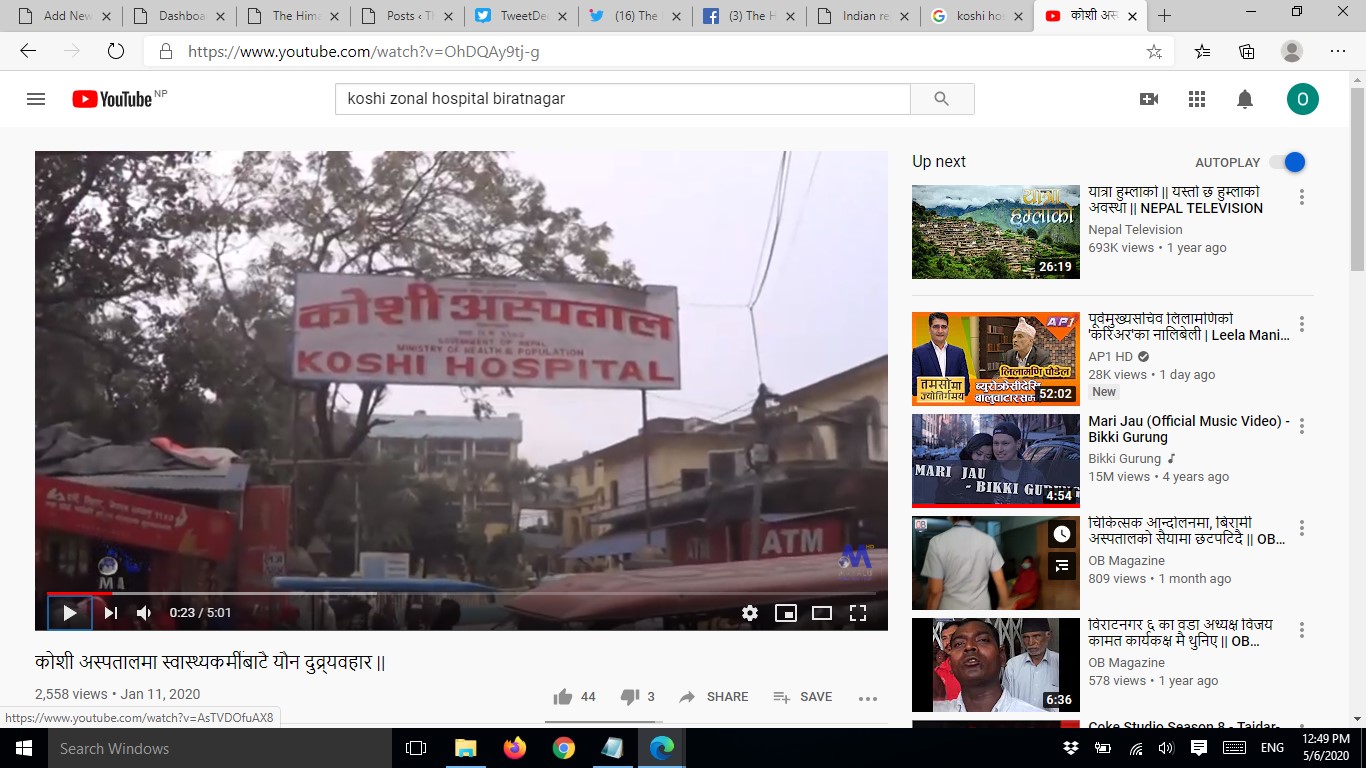Duty comes first for these Koshi lab heroes
Kathmandu
Since January, 96,205 Polymerase Chain Reaction (PCR) tests have been done in 20 laboratories across Nepal. As of June 7, a total of 3,448 cases have been confirmed out of the tests performed, in 71 of the 77 administrative districts.
A team of health professionals working at the COVID-19 testing facility of Koshi Hospital Laboratory, Biratnagar, share their experience of working in high risk conditions in a telephonic interview with The Himalayan Times.
Their workplace and team
The lab has been carrying out over 200 COVID-19 tests a day from samples collected from the entire Province 1 as well as Saptari district of Province 2. Since April 10, the lab has tested more than 5,000 samples with 143 cases testing positive for COVID-19 as of June 7.
Started on April 9 as per the directives of Ministry of Health and Population (MoHP), the lab comprises a team of five health professionals headed by Clinical Microbiologist Pranav Kumar Yadav, who hails from Sinamangal. The other members are Medical Technologist Lalit Narayan Chaudhary from Sunsari, Medical Biochemist Binay Kumar Yadav from Sunsari, Biochemist Om Prakash Yadav from Biratnagar, and Lab Assistant Durga Prasad Bajgai from Biratnagar.
To fulfil its infrastructural needs and medical equipment, the lab is being assisted by Public Health Laboratory and Koshi Zonal Hospital, Biratnagar.
Tests for COVID-19
COVID-19 is a respiratory disease that infects the upper and lower respiratory tracts of a person through the nasal pathways, informs Pranav Kumar. Thus for PCR testing, swabs are collected from a patient’s throat and nose as part of oropharyngeal and nasopharyngeal samplings. “The swabs from these parts are vital for appropriate results,” he says. The testing process takes around eight hours, but “the results arrive a day or two later because of how long it takes to transport samples to labs” as per Pranav Kumar.
So, chances of false/negative results could be high? As per Chaudhary, there is minimal chance of the test generating false result. “It is rare. We have not encountered any such cases so far,” he assures.
As per him, there exist numerous reasons for false negative results by PCR test, one could be that the patient may not be infected during the time of sample collection.
Citing other reasons he points to poor quality of samples comprising none or less viral content, mishandling of samples during the storing or transportation process, technical mistakes like virus mutation, or PCR inhabitation.
But he assures that “all frontliners working in the testing field are conscious of everything as the matter is serious, and one mistake could lead to multiple casualties.
There are rare cases (of false negative results) in Nepal so far.”
Expansion of accessible testing facilities must
With the number of infections rising, would there be a possibility of widespread hidden cases? Binay Kumar opines, “Seeing the rising cases of coronavirus, it can be said there are hidden cases due to lack of testing facilities. But now that testing has reached every nook and corner, and there is less chance of hidden cases.”
It opens space regarding awareness for everyone — “if you think there’s a possibility of hidden cases, you should be aware and follow safety measures and lockdown put in place by the government. Testing would not be the solution here; the solution is how you protect yourself.” The only solution to contain the spread of the virus is expansion of accessible testing facilities across the nation. “Only screening and diagnosing can stop the spread infection in families and communities if it has existed silently,” says Chaudhary.
Always at risk
While they worry about people’s safety, they themselves are the most at risk while carrying out their duties. “Every health professional like us are risking our lives. It’s like playing with death, but there’s a satisfaction we are serving humanity,” says Om Prakash.
Reflecting professional values, Bajgai said, “It’s hard to explain what we go through, but this is the profession we chose, so we can’t back off at this time. We have family who worry every single second; we want to be with them, but we dodge their questions saying we will be coming home soon.”
These health professionals say the work of COVID-19 testing in Nepal is good and progressive to an extent. Though there is limited manpower, “health professionals at all testing facilities in Nepal are working day and night to give appropriate results,” they say.
At their testing facility, they are “working three shifts a day from 6:00 am- 9:00 pm daily” due to limited manpower.
As per Yadav as there is a high chance of the lab getting contaminated, “we use PPE, gloves all the time during lab work”.
The team disinfects the benches, micropipettes, biological safety cabinet with 70 per cent ethanol.
All consumables are treated with sodium hypochlorite solution. The whole lab is fumigated twice a day. The one thing that keeps them doing what they are doing is “the support and respect that everyone gives us”.






